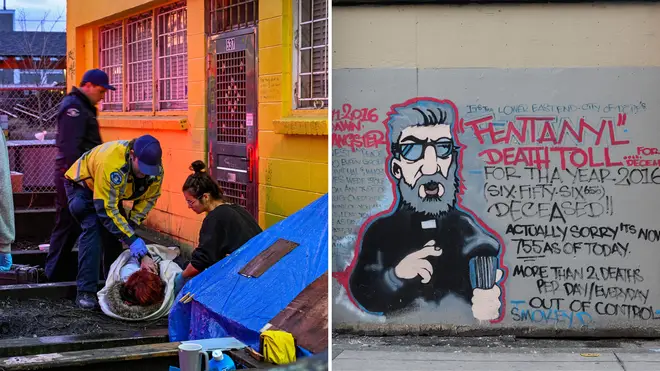
Ian Payne 4am - 7am
3 May 2023, 06:00

The UK is facing a "beyond complicated" crisis in the battle to keep an opioid that is 50 times stronger than heroin away from its borders.
A year on from a ban on poppy farming in Afghanistan, it’s feared fentanyl – a synthetic drug behind a rising number of deaths across America and Canada – could fill the heroin gap.
According to the Royal United Services Institute, 95% of Britain’s heroin supply derives from Afghanistan.
Dr Lorna Nisbet, a forensic toxicologist at Dundee University, told LBC that scientists in the UK are "tracking the living daylights" out of the situation and praying fentanyl doesn’t get popular like it has in the US.
It comes after UN researchers monitoring the poppy ban suggested synthetics could replace natural opiates in the next few years.

Dominic Streeter discusses drugs
In response, Dr Nisbet said examples like the nitazene outbreak in London in 2021 demonstrate lethal, lab-made drugs can sometimes only be tracked and flagged after people have died.
“That only got found out because of the users saying this stuff is not right, I’m losing all my friends.
“So, we can have all the analytical tools and I can sit in my fancy lab, but actually it’s the users that tend to tell people working on the front line if something's changed.”
Though, certainly in Scotland, Dr Nisbet said, it only takes a small number of deaths to trigger an alert over a new drug.
Dr Lorna Nisbet discusses fentanyl
Currently, fentanyl is uncommon in Britain – implicated in fewer than 100 deaths per year versus 3,338 (1,119 in Scotland) from all opiates and opioids, according to the Office for National Statistics and National Records of Scotland.
But in the US, fentanyl implicated deaths have escalated by around 600% between 2015 and 2021 according to the country's National Safety Council.
Meanwhile in the Canadian city of Vancouver, fentanyl is linked to around 2,000 deaths a year.
Dominic Streeter filmed his Netflix documentary Ten Dollar Death Trip in the city.
The Londoner told LBC: “It’s terrifying. There’re stories of tiny doses equivalent to a few grains of salt killing people.
"But it’s a game of Russian roulette because it also might not kill somebody, so it gives users a false sense of security.

"It’s cooked up by gangsters in their basements – the potency can change from week to week.
"And while I’m sure dealers don’t want to kill their customers the pure market forces mean it’s much more viable than heroin. It’s cheaper, smaller, the profit margins are huge and it’s easier to package and transport.
"Users there are scared of it. The problem is they can’t buy heroin anymore because the market’s been wiped out.
"I can’t find the words to describe the impact [in Vancouver], it’s ruined communities, it’s reduced average life expectancy, it’s caused carnage."
At the Forth Valley Recovery Community in Stirling, LBC found out what the impacts of synthetics could be on people with lived experience.
Recovering heroin user Scott explained that more potent and potentially fatal drugs can be attractive to users.
"I remember at some points I used to hear that some guys were overdosing and you're like oh where'd he get it? I want some of that, I'll just watch what I'm doing with it," he said.
"As a youngster I used to draw invisible lines, thinking I'll never use that, then crossed it. When I became addicted on a daily basis, all bets were off, I'd use anything that'd change the way I felt."
Fellow community member Sarah is also recovered and wants to advocate for other mums like her, but there was a time when being a parent did not influence her drug use.
Sarah said: "I never really thought about whether it would end my life, and I overdosed young, but it never crossed my mind, even when I had a child as well."
She added the prospect of deadlier drugs becoming available here made her worry about older users with health problems too.
However, working out of her lab in the drugs death capital of Europe, Dr Nisbet has also studied the crisis in North America and said much of it was worsened by addiction to prescription opioids.
This has not been a problem in the UK, so we would not be facing the “mass” of opioid fatalities like in the US.
But she claimed an intelligence gap in heroin, because it is not seized and analysed at the same rate as cocaine, would make the task of identifying any substitutes or lethal mixes more difficult.
Read more: Lamb and '£10,000 heroin and cocaine haul' found during police raid of car on the M74
Dr Nisbet said: "You need to ship less [fentanyl] to have the same number of doses to sell. So, smuggling it is easier, it's a synthetic, so you're not impacted by weather, soil conditions, temperatures the way any other crop would be.
“If it [a synthetic opioid] becomes more potent, then you don't have to take as much, meaning you have less in your body. So, for somebody like me to test that it becomes much, much more difficult.”
Premixing fentanyl with other drugs like benzodiazepines in illicit US markets is also a cause for anxiety from the Dundonian academic’s perspective.
"Here, we love heroin, and we love benzos. So, everyone in Scotland is sitting thinking 'oh no please don't make this a thing,'" she said.
Officials in the UK are well equipped to monitor these new synthetics and add them into the system, "but we can't add stuff in if we don't really know that it's there to add in in the first place,” Dr Nisbet explained.
"We do a lot of data sharing though. The RADAR report in Scotland for example. There is also The Advisory Council on The Misuse of Drugs, that's people across the UK that meet."
Ultimately, the situation is "beyond complicated" in Dr Nisbet’s words and a heroin drought from Afghanistan is just another thing to add to the list.
"We’ve also got all these benzodiazepines changing, these users potentially getting older with more and more complex health issues.
"So, it’s a concern, but the whole thing's a concern really and we'll always have issues in our heroin supply, its rubbish.
"In 2010 we had anthrax in our heroin because there was anthrax in Afghanistan, and that infiltrated our supply, and we lost people.”
Dr Nisbett said experts were holding their breath, "hoping and praying we do not get the fentanyl situation that is going on in America."
A UK government spokesperson said: "Tackling the criminality behind drug supply at every stage of the supply chain is a key component of the government’s 10 year drugs strategy.
"We are tough on all drugs, including heroin and fentanyl. The quantity of heroin seized at the UK border remains at some of the highest levels of the last decade, with more seized in the year to March 2022 than in any of the seven years prior to 2019/20.”
A Scottish Government spokesperson said: "We continue to focus on supporting all those affected by problem substance use, delivering real change on the ground and implementing evidence-based approaches we know can help save lives.
"Emerging new substances, or changes in drug trends, can have significant consequences for people who use drugs which is why stepping up public health surveillance, including monitoring the substances in circulation, is a priority for our National Mission on drugs.
"We’re committed to delivering drug-checking facilities in Scotland which would also enable us to respond faster to emerging trends. We anticipate that license applications to the Home Office, to grant permission for the establishment of these facilities in Glasgow, Dundee and Aberdeen, will be submitted later this year.
"We are in touch with international experts, such as the European Monitoring Centre for Drugs and Drug Addiction (EMCDDA) and the United Nations Office on Drugs and Crime (UNODC), to engage around emerging drug trends and to assist in future-proofing ourselves against potential risks."